A thoughtful anonymous commenter ("AC") on this blog recently said (in reply to a recent post about mishandling of DC characters under Dan Didio),
"This probably sounds like a hopelessly simplistic take on comics, but I swear it makes sense to me: just write good stories about your characters."
The comment was so heartfelt that it seemed like it merits a reply-in-post, rather than by comment.
As Plato pointed out, "No man knowingly does evil".
 |
| Then again, Plato never met Tom King. |
1. We need to define what constitutes "good". That's part of what this and many of my other posts (such as my screeds against decompression) try to help do.
Sometimes we have to do that by process of elimination: identifying elements that make stories bad. It's why so much fandom--not merely of comics but in general--focuses on negative criticism. It's a natural (if unpleasant) tool in the search for The Good. Because if years spent reading ancient philosophy teaches you anything, it's that "The Good" can be difficult to define quickly and succinctly.
"Just write good stories" runs smack into the wall of that conundrum of ancient philosophy: "What is The Good?"
Is adhering to the structural basics of storytelling (as discussed in our next point) "good writing"? I don't think so. I mean, you can drive a car perfectly well, but still use it to do evil things; so, too, with stories.
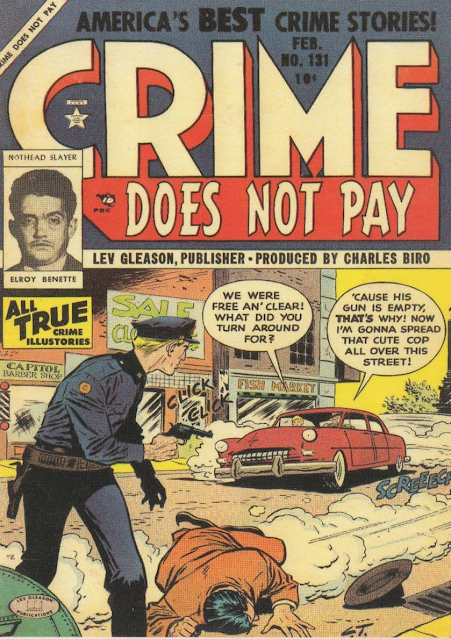 |
| I learned that from Dr. Wertham. |
When the Joker had his own comic book series in the '70s, one of the problems was that the Comics Code--or, if nothing else, the zeitgeist at the time--insisted that the villain not be allowed to get away at the end of the story. So EVERY ISSUE ended with the Joker getting captured (or the implication that he was about to be captured). That's because The Powers That Be felt that a "good story" couldn't end with a villain escaping. Is that something we would all agree on today?
There are other examples where time and place shift what is considered "good" in a story, but instead let's consider character. Some readers feel that good stories will always show Bandanaman acting in character ("Bandanaman would never use a Kleenex; it's against his code."). Some reader feel that good stories show that Bandanaman isn't perfectly predictable; that would make him and his stories boring ("Did you see what Bandanaman did this month?!"). Some readers feel that good stories show that Bandanaman is neither predictable nor unpredictable, but adaptive, and make his choices depending on the situation at hand. ("What do you think about Bandanaman's difficult decision this month?")
 |
| But does anyone care about what Bandanaman thinks...? |
What about taste? I love me some Jonah Hex, the DCU's standout weird western character. The dark ironies, the poetic justice, the small but deep personal drama with an ever changing landscape of characters.
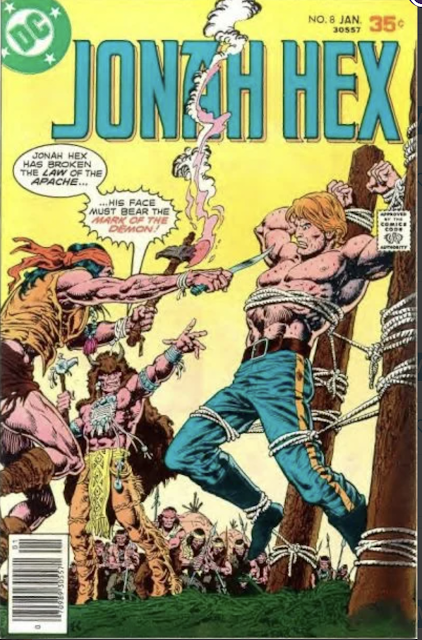 |
| And there's some special appeal in brawny bondage and branding, done tastefully. |
But others readers do not like those things. To them, the very elements that make a Jonah Hex story good to me are what make it a bad story to them. So, to them, there can be no 'good Jonah Hex story', unless you write one that discards those elements, making it so out of character that a reader like me would say it's 'not a Jonah Hex story at all'.
 |
| I mean, it's not like you can send him into a post-apocalyptic future, or have him befriend Justice Leaguers, or hang out with Space Cabbie. |
I could continue, but I hope you get the point. "Good" is a great concept in the abstract, but it falters as a yardstick for the concrete. Yes, it would be good if everything were just... good. But good is not the same thing in every case, at all times, for every person.
That's not to say that "good" is meaningless as a goal for stories. But we must accept that it is more of a question than it is an answer.
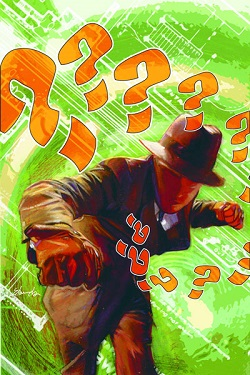 |
| If only I could think of an appropriate philosophical comic book reference for this point. |
2. We need (believe it or not) to continue to define (or at least re-emphasize) what a STORY is. You'd think Aristotle would have covered that sufficiently in The Poetics, but I guess everything needs rebooted for a new millennium.
 |
| I do recommend The Poetics, which will not give you a headache or make you angry. Unlike SOME ancient philosophers, Aristotle knew how to keep it tight. |
Stories have a comprehensible plot, Grant Morrison.
These are all necessary to making a story. But note (as discussed in point 1) they do not necessarily or automatically make a story good.
 |
| If they did, then Dazzler would be the perfect Aristotelian character. |
3. The word "your" in the sentence is a major problem. In fact, it may THE major problem for many modern comics writers. THE CHARACTERS AREN'T THEIRS. They aren't "your characters" Mr/Ms. Writer; they are "the characters".
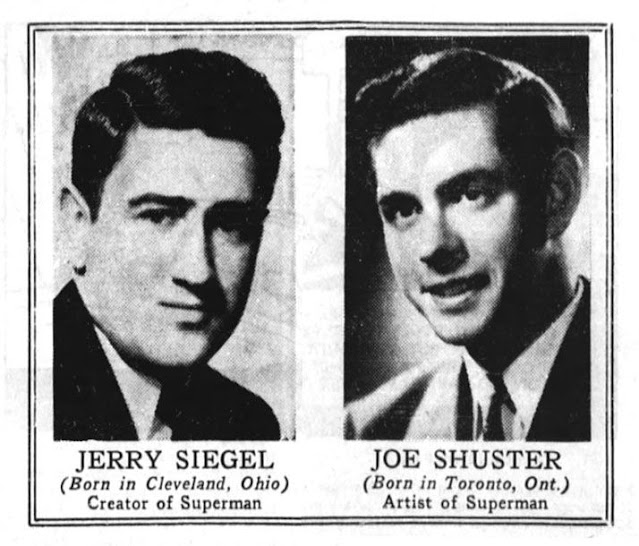 |
| Just ask them. |
They do not belong to you. Not legally, historically, culturally, or creatively. They are on loan. They exist already. Many of them, as I pointed out in a recent post, were created before you were, Many will be around long after you are gone.
 |
| I learned that from Mr. Mxyzptlk. |
Your job is to tell stories with the characters, not alter them, and many writers simply can't or won't color within those lines.
When a writer is assigned (or actively chooses!) a character they often have (or are assigned!) the goal of making the character more popular. Sales matter, after all. So they may think, "Why don't some readers like this character? What can I do to make Readers-Who-Do-Like-This-Character like this character?" Since they can't change the readers... they change the character. Maybe they themselves never liked the character; maybe they chose the character because they thought it needed to be changed.
It's a natural impulse. It's also usually wrong. If your car doesn't work, trying to turn it into a boat won't either. Just invest in fixing the damned car, or junk it.
Either the character (or group, world, set-up, etc.) are intrinsically, conceptually flawed (in which case, it should be abandoned) or it hasn't been handled correctly (or its past handling is no longer correct with changing times). The answer in the latter case is to handle the character correctly, not alter them essentially. If you change the character so severely that it now appeals to the people who didn't like it before, you are nearly certain to lose the people who liked it in the first place because you've now abandoned its original elements.
You how do you handle such a character correctly? You can grow them. You can expand them. You can extrapolate them and their worlds in logical ways consistent with their themes, history, and generally accepted personality and relationships.
This is why, although Geoff Johns has some flaws in the structure of his writing, and sometimes he's willing to write violence graphic enough to be contrary to the taste of some readers, I still consider him a very good writer to be emulated as much as possible. Geoff Johns knows how to handle characters and their worlds correctly: neither with stifling reverence, nor with revisionist contempt.
 |
| Just read Jane Jacobs, people. Urban revitalization is the perfect metaphor for, well, most things. |
He is not here to preserve your old downtown in lucite as a tourist attraction of times past, nor is he here to raze it to make way for some putatively superior shopping-mall of the future.
 |
| Have you noticed that one of the first things Johns does when (re-)establishing a character is (re-)establishing their unique urban environment? |
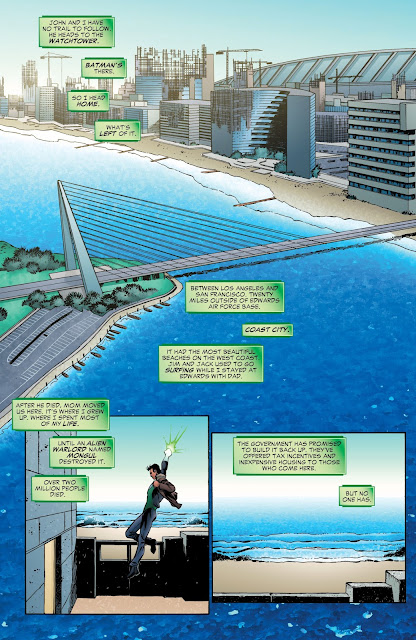 |
| Because I have. |
He is here to renovate and revitalize and capitalize on whatever is unique in your town. Will you like all the stores/stories and what's in them? You will not. But the renovator has created a new energy, a more stable infrastructure, and larger more diverse environment that permits new storefronts by other writers whose wares will interest you.
So to recap. In order for writers to 'just write good stories about the characters', we have to reach a consensus--or fight for a victory--on the idea of what constitutes good writing, in structure, style, content, and goals and what the characters (and their associated world-props) are, are like, and are capable of being and in such that way, even if not every character will appeal to every person, that every person should at least being able to find some significant characters that appeal to them.
It's not a hard goal to describe. Just a hard one to achieve.

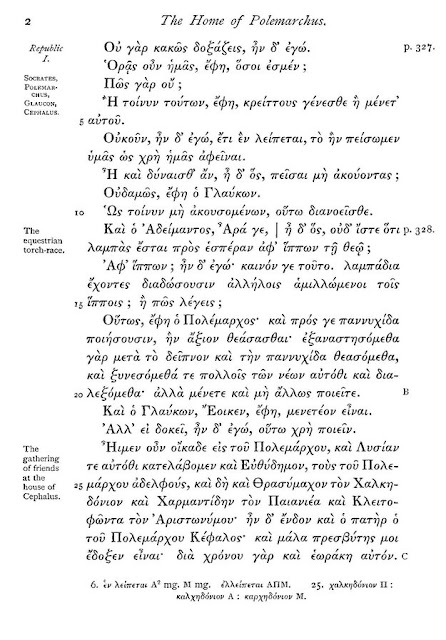
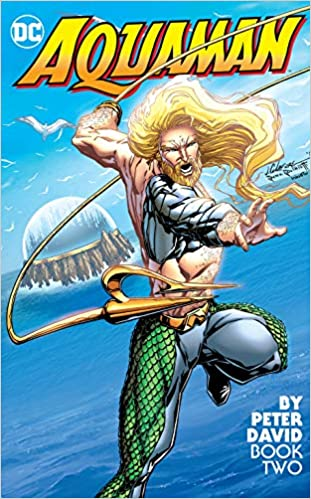
20 comments:
I am honored to have inspired your post, thank you!
Indeedy, there are many layers to what constitutes "good"; I tend to focus on the story concept. I can't help it if the writer has a tin ear for dialogue, but I can overlook it. If the art isn't to my liking, so be it; it can still be a good story. Where I tend to judge a story is basic plot and motivation; while I know that "good" is really difficult to define, I feel like we can at least figure out a general direction where good lies and set off in that direction.
As you point out, there is always going to be a certain amount of debate about how to do a character right; and yet, somehow we do collectively agree on some concepts about what is basically right about a character. Some ideas gel; it happens. In broad strokes, Superman saves people and nobody is so fallen that he won't help them if they let him. There are some people who disagree with that, but I bet they're not Superman readers, nor are they ever likely to be. DC tried to fix Superman to appeal to those people in the New 52 -- depowered, surly, bad haircut, rides a motorcycle, hated and feared, gets into fist fights with the police -- and as should surprise nobody, it didn't spark new interest in Superman. All it did was turn him into a disappointing Wolverine wannabe.
Counterpoint: The Siegel and Shuster Superman has very little to do with the Mort Weisinger Superman who has very little in common with the Julie Schwartz Superman. On the Marvel side of the aisle everyone who wrote Captain America from the seventies till I lost track wrote a completely different character. Likewise the Fantastic Four were a staid, boring comic for decades because nobody felt comfortable moving beyond the Lee/Kirby template. Sometime total reinvention works!
I think, MarkAndrew, that depends on what you count as the essential characteristics of the character, and what you count as an "expansion" rather than an "alternation". I feel that IS my point, more than it is a counterpoint!
Yeah, that's fair. There's definitely been a change in tone of mainstream superhero comics over the last decade-or-so, where every writer is trying to imbue every book THEIR own unique vision.
Which has always happened - all writing is autobiographical - but was more fun when it was accidental.
Good defense of Geoff Johns, btw. I never thought about his fundamental optimism before and how important that is to superheroes. (Sadly, "ability to tell a joke" and "shows cultural influences beyond superhero comics and action movies" are ALSO pretty high up there on things I want from a superhero writer.....) But I think I get the appeal now.
Huh. Oddly enough I think those are two things that I really like about YOUR writing.
"Yeah, that's fair. There's definitely been a change in tone of mainstream superhero comics over the last decade-or-so, where every writer is trying to imbue every book THEIR own unique vision."
This. Very well put, this. Shall we talk about how Benjamin Percy turned Green Arrow into a Social Justice Werewolf because he thought it would say something about white privilege to turn Ollie into a feral contagious monster? Or Ann Nocenti basing her Green Arrow on a hastily-skimmed reading of the Wikipedia page and basically writing a new character? Or Lemire's Green Arrow who might as well have been an Elseworlds version of Ollie? GA is a character with multiple takes that have been around enough to have standing; at least try to keep consistent with some of them.
I'd rather not talk about how Benjamin Percy did ANYTHING.
Isn't Johns just a gore fetishist disguised as a Golden/Silver Age nostalgia enthusiast (who I have severe doubts about him reading ANY comic from either time period).
Yes. That's it exactly. It's all an elaborate deception to force innocent children to read gore-porn, Dr. Wertham.
Honestly, I'm not sure whether this comment is just dumb or trolling.
Of the 10,000 things I could say, i'll confine myself to:
he brought back Edward Clariss. And Ian Karkull.
Once YOU"VE looked them up, it should be as evident to you as it is to me that your Severe Doubts say worlds about you and nothing about Geoff Johns comic erudition.
Dislike his style all you want; it's matter of taste and this is America.
Doubt his comics scholarship (and devotion) and you just look like a damned fool.
Wake me up when he decides to reverse the damage done to Fiona Webb for one thing. Not to mention when he learns to be more subtle with his designs.
... You somehow blame Geoff Johns for what happened to Fiona Webb, Barry Allen's rebound girlfriend (a throwaway character set up just to give Barry an excuse to kill Eobard), in 1983?
Geoff Johns was ten years old when that happened. I think you overestimate his influence. Or do you just blame him for not bringing back one small particular piece of DC history that matters to you, which would be out of sync with the rest of it?
As for "his designs": Geoff Johns isn't an artist. I don't think he has "designs", subtle or otherwise. Regardless, if these are the sort of details that are tripping you up, I'd be shocked if you like anyone's writing, because you seem to be missing the forest for the trees.
Original "earnest" Anonymous chiming in - Geoff Johns has his strengths and his weaknesses, and like any number of creators he is best reined in by an editor.
Johns's big strengths: he knows how to zoom in on what makes a character work, and how to put them in a story to showcase that. He also understands the trick of finding two opposing bad things about a character and structuring them against each other so that it makes things make more sense (such as tying Hal Jordan's descent into madness to the yellow weakness).
Johns's big weaknesses: big action that threatens to break the world it's happening in, and an occasional urge to be "edgy" in ways that end up being silly. Essentially, showing questionable judgment in terms of where a story "could" go and where it "should" go.
I should like Geoff Johns. He likes all the characters I grew up reading: Hal Jordan, Barry Allen, Legion of Super-Heroes, but I feel like all he brings is "set them back to how they were." I can't name an actual _story_ of his. I read Infinite Crisis and Darkest Night and Doomsday Clock and I can't tell you want they were about. I'm pretty sure they all had a moment about optimism and stuff but as a story? I don't know.
I do agree that too many writers now are all about upsetting the status quo. I get that it is what sells but it never makes any lasting change and rarely makes good stories. I think there's probably a reason why whenever I day dream about writing a DC character I always pick ones that would work well in the background like Phantom Stranger or Black Orchid and the secondary characters are the ones that get the spotlight.
"He also understands the trick of finding two opposing bad things about a character and structuring them against each other so that it makes things make more sense "
This is a very interesting observation. Can you give any more examples? Johns aside, I love the idea of combining two problems into a solution.
I think my principle issue John's plotting is 'turning the tide'. He never fails to come with some surprising link or connection underlying a plot that I don't pick up on, despite being pretty well versed in DCU history. And yet every plot comes down to:
1. "But now the villains have reached such numbers and strength, through a series of dramatic reveals, that the heroes cannot possibly win!"
2. "Yet NOW the heroes win ANYWAY by just suddenly obviously being better and stronger, for no apparent REASON."
There's no trick. No clever ruse. No sacrifice. No special combo. Not even a deus ex machina. Just, the Villains Are Winning, Oops, But Now The Heroes Win. It seems like an EASY thing to do, compared to some of things he DOES do as a writer, that's what mystifies me.
I can't think of a clearer example of Johns taking two bad things and making a good thing out of them, sorry. It's enough to illustrate that he understands you can do it though. To do it, you usually need two broken things at a time, and Geoff doesn't always have pairs of things.
So how do you feel about writers like Al Ewing and Scott Synder?
I've never heard of Al Ewing.
Scott Snyder created:
"Court of Owls · Harper Row · Duke Thomas · The Batman Who Laughs · Perpetua"
I think we'd better off without ALL of those, except for Duke Thomas, but nobody seems interested in using him, anyway.
Well here's a list of what he's done so far. Just let me know if anything jumps out at you: https://en.wikipedia.org/wiki/ Al_Ewing#Selected_bibliography
All of Ewing's work has been for Marvel, which I don't read.
The thing I always found a little strange about Geoff Johns is that he obviously loves Silver Age DC and brought a lot back. But in doing so he changes characters in pretty big ways. For example, Barry Allens new parental trauma and personality. I'm not familiar with GL stuff, but I think he gave Hal a tragic origin too and made the Guardians evil-ish? And in Teen Titans he completely changed Impulse and Superboy and turned Ravager and Jericho evil. So Johns always seemed pretty revisionist to me... Still liked his stories tho.
But recently he seems to be caught in an attempt to prove himself as a "deep" writer by imitating Alan Moore. I'm not the greatest Moore-Fan, but Doomsday Clock and Three Jokers just felt like cringy fanfiction, copying style and themes without understanding why those worked. And even in Flashpoint Beyond he's trying to put down a definitive name and origin of the Joker, which is just... you shouldn't do that. Nor should you give the Joker a son that becomes the next Robin :/ I hope the upcoming JSA-revival will bring Johns back to writing to what he's actually good at
Post a Comment